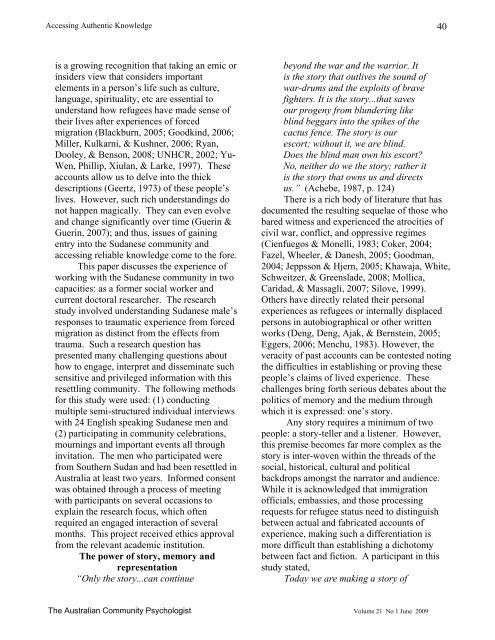issue 1 09 - APS Member Groups - Australian Psychological Society
issue 1 09 - APS Member Groups - Australian Psychological Society
issue 1 09 - APS Member Groups - Australian Psychological Society
You also want an ePaper? Increase the reach of your titles
YUMPU automatically turns print PDFs into web optimized ePapers that Google loves.
Accessing Authentic Knowledge40is a growing recognition that taking an emic orinsiders view that considers importantelements in a person’s life such as culture,language, spirituality, etc are essential tounderstand how refugees have made sense oftheir lives after experiences of forcedmigration (Blackburn, 2005; Goodkind, 2006;Miller, Kulkarni, & Kushner, 2006; Ryan,Dooley, & Benson, 2008; UNHCR, 2002; Yu-Wen, Phillip, Xiulan, & Larke, 1997). Theseaccounts allow us to delve into the thickdescriptions (Geertz, 1973) of these people’slives. However, such rich understandings donot happen magically. They can even evolveand change significantly over time (Guerin &Guerin, 2007); and thus, <strong>issue</strong>s of gainingentry into the Sudanese community andaccessing reliable knowledge come to the fore.This paper discusses the experience ofworking with the Sudanese community in twocapacities: as a former social worker andcurrent doctoral researcher. The researchstudy involved understanding Sudanese male’sresponses to traumatic experience from forcedmigration as distinct from the effects fromtrauma. Such a research question haspresented many challenging questions abouthow to engage, interpret and disseminate suchsensitive and privileged information with thisresettling community. The following methodsfor this study were used: (1) conductingmultiple semi-structured individual interviewswith 24 English speaking Sudanese men and(2) participating in community celebrations,mournings and important events all throughinvitation. The men who participated werefrom Southern Sudan and had been resettled inAustralia at least two years. Informed consentwas obtained through a process of meetingwith participants on several occasions toexplain the research focus, which oftenrequired an engaged interaction of severalmonths. This project received ethics approvalfrom the relevant academic institution.The power of story, memory andrepresentation“Only the story...can continuebeyond the war and the warrior. Itis the story that outlives the sound ofwar-drums and the exploits of bravefighters. It is the story...that savesour progeny from blundering likeblind beggars into the spikes of thecactus fence. The story is ourescort; without it, we are blind.Does the blind man own his escort?No, neither do we the story; rather itis the story that owns us and directsus.” (Achebe, 1987, p. 124)There is a rich body of literature that hasdocumented the resulting sequelae of those whobared witness and experienced the atrocities ofcivil war, conflict, and oppressive regimes(Cienfuegos & Monelli, 1983; Coker, 2004;Fazel, Wheeler, & Danesh, 2005; Goodman,2004; Jeppsson & Hjern, 2005; Khawaja, White,Schweitzer, & Greenslade, 2008; Mollica,Caridad, & Massagli, 2007; Silove, 1999).Others have directly related their personalexperiences as refugees or internally displacedpersons in autobiographical or other writtenworks (Deng, Deng, Ajak, & Bernstein, 2005;Eggers, 2006; Menchu, 1983). However, theveracity of past accounts can be contested notingthe difficulties in establishing or proving thesepeople’s claims of lived experience. Thesechallenges bring forth serious debates about thepolitics of memory and the medium throughwhich it is expressed: one’s story.Any story requires a minimum of twopeople: a story-teller and a listener. However,this premise becomes far more complex as thestory is inter-woven within the threads of thesocial, historical, cultural and politicalbackdrops amongst the narrator and audience.While it is acknowledged that immigrationofficials, embassies, and those processingrequests for refugee status need to distinguishbetween actual and fabricated accounts ofexperience, making such a differentiation ismore difficult than establishing a dichotomybetween fact and fiction. A participant in thisstudy stated,Today we are making a story ofThe <strong>Australian</strong> Community Psychologist Volume 21 No 1 June 20<strong>09</strong>
















